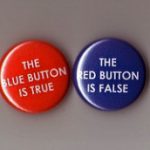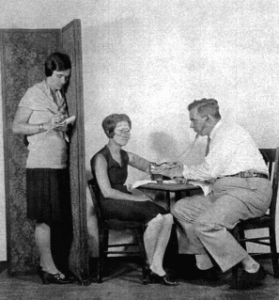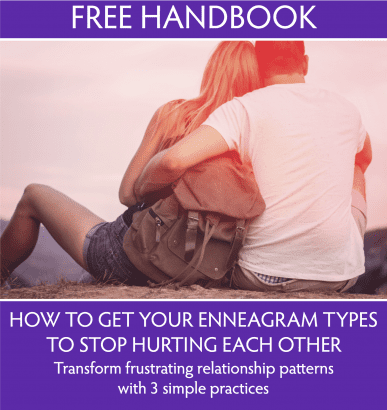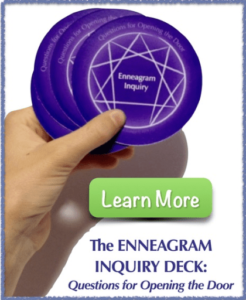Why did I choose this person?
It seems they are here just to push my buttons!
No matter what I try, they won’t respond the way I want!
Do they even care about me?
Why can’t I figure this out?
What’s wrong with me?
Have you ever had a thought like this dart through your mind when you can’t break through the gridlock in your relationship?
So have I. So have we all.
How can the Enneagram help us in this ancient dilemma that poets, philosophers and psychologists have already tried to answer in countless ways? The Enneagram reveals how we inadvertently sabotage our own ability to be satisfied— at least in a deep or lasting way. It also points the way toward how we can do things differently.
“It Shouldn’t Hurt To Love”
More than in other arenas in life, how we feel in emotionally committed relationships has enormous impact on our well-being. We are more vulnerable here than at work or at a party.
In our intimate relationships we want to bring our best selves forward and to be able to reach out for support when we’re in need. When this is missing, or worse yet, when we feel mistreated, it can be heartbreaking. We pout, we protest, we cry, we grasp, we push away, we collapse.
It’s like we’ve been duped. Where we used to see the likable, steady nature of our partner, we now see cold bitterness. What used to be their warm, caring approach now seems invasive and patronizing. Why have they turned on us?
While in our hearts we imagine that love should generally feel pleasurable or comforting, love relationships necessarily include aversive emotions, too. Does that mean love has left us in those moments?
What if we were to consider the possibility that pain in love is not only unavoidable, but that it can actually be helpful if we work with it well?
Including the Difficult
One of many things I appreciate about the Enneagram is its invitation to resist pushing away the difficult, its invitation to honestly face what’s hard as a part of life. We all have difficulty, so why not figure out what it’s here to tell us and and what it’s trying to get our attention about?
In a certain way it is human (and animal) nature to avoid pain— to instinctively try to stop it, fight it, or get away from it. This often serves us— it is good to take our hand off a hot stove, or to flee from an attacker.
Is it surprising to you that avoiding pain can also add more stress and suffering? When a mother in (an ordinary) labor braces against the intense pain she feels, she may end up prolonging or intensifying it. When her body stops resisting the pain, she is more able to open to and cooperate with the process, typically making the pain more bearable and shortening the labor.
In dealing with emotional pain, our personalities themselves often “backfire.” A few examples:
- You are hurt by your partner’s criticism, so you turn away. You feel hurt and angry, they feel even more hurt and anger than they did before, and their need to bring forward the trouble increases. Repeat.
- You block your guilt because it feels intolerable, thus you miss your inner cue to make amends or to repair in relationship.
- You fight back when your partner says something mean, wanting to stop the pain. You miss what’s underneath their comment, and pour gas on the fire.
So what helps in times like these? One key thing that helps to start is to simply notice that we may be increasing our trouble through our approach.
If we can pay non-judgmental attention to what’s happening with us in stressful times, we are more likely to be able to respond to distress in a useful way. It may become possible to realize exactly how our Enneagram type’s limitations are helping to create and sustain our distress.
Paradoxes of the Nine Types
Why would our ego-structure be sabotaging us? Isn’t it there to support a functional personality in the world? This is a troubling truth that we all grapple with, consciously or not, every day.
One definition of paradox is a statement or proposition that, despite apparently sound reasoning from acceptable premises, leads to a conclusion that seems senseless, logically unacceptable, or self-contradictory.

Each Enneagram type develops premises and conclusions about the world that seemed “sound” based on our reasoning in early life. In many cases our core perspectives did help us develop adaptive strategies given our environments and our caregivers.
For example, for Type Five, it may have made perfect sense as a child to seek comfort and security in my own mind and to retract from too much dependence on others. This approach likely helped me through a lot. Now however, as an adult, the same approach, while still insistent and central, breaks down for me. Not only does it fail to protect me in the way I’d wish, I can see how it sometimes makes me more trouble- creating social misunderstandings and frustrating my partner. This feels confounding, paradoxical.
Author Mary C Morrison describes paradox as follows:
We stand in a turmoil of contradictions without having the faintest idea how to handle them: Law/Freedom; Rich/Poor; Right/Left; Love/Hate—the list seems endless. Paradox lives and moves in this realm; it is the art of balancing opposites in such a way that they do not cancel each other but shoot sparks of light across their points of polarity. It looks at our desperate either/ors and tells us they are really both/ands—that life is larger than any of our concepts and can, if we let it, embrace our contradictions.
The paradoxes for each of the nine Enneagram types can be hard to recognize, especially when we’re caught in the trance of our type.
Our enneatype presents a core approach to life that seems like “the Truth.” When our approach doesn’t seem to work, what we’ll often do is try harder with it. This will not satisfy or meet our aim. Mick Jagger expresses the feeling of exasperation as he sings, “I can’t get no satisfaction… I try and I try and I try and I try.” We can keep trying the same approach incessantly and it is still unlikely to get us what we’re longing for.
When we can realize that what drives our type also inadvertently drives much of our suffering, we are invited into new territory. It may be disorienting. I may resist it. But if you look, it’s right there in all of our faces. 
As I’ve often said, it is not a bad thing that Enneagram types (personalities) exist. They serve a key purpose. The trouble is that they are based on core misconceptions about ourselves and reality. Perhaps you can imagine why a program based on something false/incomplete would fail to satisfy, no matter how hard we insist on it?
As you look over the paradoxes for the Enneagram types in relationship below, go through them slowly and see whether you can feel them, whether they can sink in.
For each type, I’ve articulated an Unconscious False Assumption, the Compensation for that assumption, the Unintended Consequences for self and other that flow from our assumption and compensation, and the Paradox that springs from these.
It is natural that paradoxes can be hard to grasp, so go easy on yourself. Also, this article is not stressing the gifts of each type in relationship, which is discussed elsewhere, but it will lead to the good news about how we can work with these seeming self-contradictions for the development of ourselves and our relationships.
9 Enneagram Relationship Paradoxes
TYPE 1
Unconscious False Assumption
I am not how I should be, and thus am not acceptable.
Compensation
I work hard to do what’s right so that I will be worthy and lovable.
Unintended Consequences
This striving has me resist my heart and my instincts, leaving me frustrated and feeling cut off from love.
Others experience my striving as judgmental, making them afraid to be close or open up.
Paradox
My approach to being lovable blocks me from feeling or receiving love toward myself or from others.
Type 2
Unconscious False Assumption
My worth depends on how I please others.
Compensation
I try to earn love by caring personally for special others. I hide my own needs and focus on theirs.
Unintended Consequences
By bypassing my own needs, I build up resentment which has me feel unloving and unloved.
My behavior trains others to not consider my needs.
Paradox
My approach to earn love leaves me feeling rejected and mistreated, and others feeling manipulated.
Type 3
Unconscious False Assumption
I am not loved for who I am.
Compensation
I work to secure love and approval through being a successful version of what I think you want me to be.
Unintended Consequences
By leaving my heart to the side to pursue an image or goal, I am not available for emotional intimacy.
Others want more authentic contact which is difficult for me to deliver.
Paradox
My approach to secure love leaves me feeling lonely and empty, and others feeling perfunctory.
Type 4
Unconscious False Assumption
I am disconnected, incomplete.
Compensation
I seek for an ideal love or experience to try recover a deep lost connection.
Unintended Consequences
I disappoint myself with what is here, which leaves me feeling forlorn.
Others feel alternately pushed and pulled, making it hard to reassure me.
Paradox
My approach to find love leaves me feeling disappointed, and others emotionally exhausted.
Type 5
Unconscious False Assumption
The connection I want will deplete or overwhelm me.
Compensation
I protect myself and my resources so that I won’t lose myself.
Unintended Consequences
My emotional and energetic withdrawal leaves me disconnected from my own heart and from others.
Others find me distant or disinterested.
Paradox
My approach to self-protect (or to seek connection in a “safe” way) leaves me feeling overwhelmed or disconnected, and others confused.
Type 6
Unconscious False Assumption
No one will reliably be there for me.
Compensation
I try to prove I am loyal and trustworthy so that you will stick with me. I watch for threats to our connection in order to protect myself from being vulnerable to hurt.
Unintended Consequences
My questioning and doubt leaves me unsure about safety in the relationship.
Others feel tested, mistrusted.
Paradox
My approach to safe relating leaves me feeling anxious or unsettled, and others frustrated.
Type 7
Unconscious False Assumption
My needs won’t get met unless I strategize and plan for them.
Compensation
I pursue getting “the goods” and am frustrated by what holds me back.
Unintended Consequences
By avoiding limitation, I miss out on the benefits of sticking-with.
Others look like demanders or limiters to me.
Paradox
My approach to ensuring a good life and relationship leaves me feeling trapped and deprived, and others feel less-than.
Type 8
Unconscious False Assumption
Others can’t be trusted with my tenderness.
Compensation
I conjure strength and vitality to hide my vulnerability from myself and others.
Unintended Consequences
My self-protective stance can be impenetrable or overpowering. My heart is hidden from both of us.
Others retract or defend in response to my pushing.
Paradox
My approach to find love leaves me feeling misunderstood and unmet, and others transgressed or defended.
Type 9
Unconscious False Assumption
I am not worth loving.
Compensation
I try to erase my personal needs and opinions to keep the peace so I will not feel separated from others.
Unintended Consequences
By discounting my worth in order to stay connected, I continue to neglect and abandon myself.
My behavior trains others to treat me as unimportant, and to overlook my needs.
Paradox
My approach to be loved leaves me and others feeling discounted and disconnected.
Taking a few breaths, see whether any of this content penetrates you. Does it bounce off? Does it stab? Does it resonate? Does it disturb? Any of these can be interesting investigations.
Are there one or two of these that you might be interested in watching for in yourself over the next few days?
So What to Do with These Conundrums?
Indeed. Whether you can see it in action in your life yet or not, these perplexing streams flow through many moments of our days. Faithfully doing their thing, they override our perceptions in the present and determine our impact without our consent.
What’s exciting to me is how this is not a dead end. Niels Bohr, who won the Nobel Prize in Physics, said, “How wonderful that we have met with a paradox. Now we have some hope of making progress.”
I would agree that paradox is a fertile place for discovery and transformation. My next article will explore just that. Stay tuned for the next installment about approaches to transcending the paradoxes for each Enneagram type.
In the mean time, please comment below about whether the descriptions for your Enneagram type seem to fit.
Would you name it differently? What will you be on the watch for?










9 Responses
Thanks for this. Always illuminating. And helpful for getting that “foot in the door”.
I believe I am a 4 at the core, but curiously I am resonating more with what I read in 1 and 7 today.
1 can understand (expected connection to 4) but the 7 intrigues me.
Thanks for this Denis. Right- sometimes 4 and 7 could be seen as opposites in their approach, but you’re on to something: 1, 4 and 7 on another “octave” of the Enneagram are their own triangle or “harmony triad.” It is called the Idealist Triad (Palmer/Daniels) or the Frustration Triad (Riso/Hudson). You can imagine an invisible line between 4 and 7 on the diagram. So as you watch yourself in each of these paradoxes, they will be useful to you.
As a Seven, I have achieved some great successes by planning well. However, I am learning to listen more to what my own limitations, as well as those of others, are telling me, and I often find that they lead to outcomes that I could not have anticipated or have simply overlooked in my planning. I also resonate with what is written above about the One in the sense that I am constantly trying or “am planning to” improve myself, which can sometimes lead to both the paradox of “me feeling less than” and the unintended consequence of “feeling cut off from love” because others are “afraid to be close or open up,” The lessons of the moment seem to be: “Remain quiet. Don’t busy yourself with so much planning. Really listen to what others (God and the universe as well as other people) are trying to say.” Instead of ‘improving yourself’ you can be finding more opportunities ‘to transcend yourself by embracing these limitations.’
Thanks for sharing, John. The receptivity it sounds like you are cultivating will be supportive regardless of type. Isn’t it cool how so many levels can be going on at once? In the soul there is not just one type…
Yes, as I have reflected on your answer, Sarah, I notice not only the soulful development you mentioned but also, on a psychological level, a move toward the higher side of the Five where, in Riso-Hudson terms, for example, the “Ecstatic Appreciator” can become the more practical-sounding “Pioneering Visionary.” On a more earthly level, this shift feels like the freedom for which the Seven is always longing, and for this Seven with a “dutifully loyal” Six-wing heavily fearful of losing friends and wanting to be popular, it congers another paradox. Will the truth spoken in love from the position of Five actually bring more friends or at least more respect from many friends who are said to want the Seven to continue being the “life of the party”?
So much to explore!
Thank you Sarah for another insightful post. Like a flash of light, your posts often speak so clearly to me, waking me out of my slumber to remember the inner me. (even if only for a moment).
You have a gift.
Hi Chuck. Thank you for your words. Yes- remembering the “inner me” even for a moment- can help reorient me. The more I find the way to remember this over and over, the more I feel engaged at the helm of my own life.
This evokes many thoughts and images – wow. The 1-4-7 connection is intriguing.